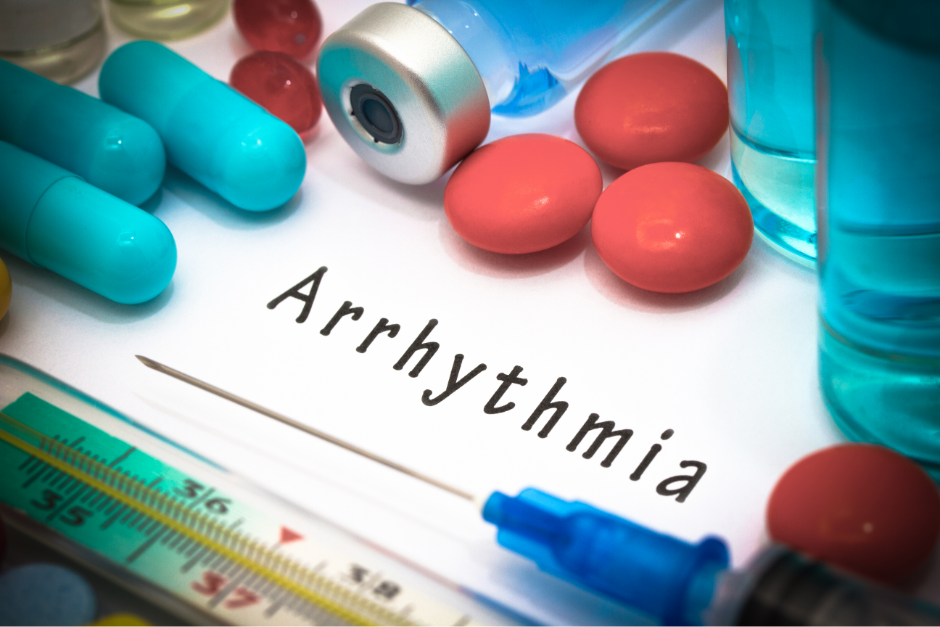Arrhythmia: Understanding Types, Causes, Symptoms, and Treatment Options

Arrhythmia, also known as an irregular heartbeat, is a condition where the heart’s rhythm is abnormal. It can manifest as the heart beating too fast (tachycardia), too slow (bradycardia), or irregularly. While some arrhythmias are harmless, others can be life-threatening if left untreated. Early detection and appropriate management are crucial for maintaining heart health. In this article, we’ll explore the different types of arrhythmias, their causes, how to recognize the symptoms, and the available treatment options.
Types of Arrhythmias
Arrhythmias come in several forms, each affecting the heart’s rhythm differently. Understanding the specific type is important for proper diagnosis and treatment.
- Tachycardia
- Definition: A condition where the heart beats faster than normal, generally over 100 beats per minute in adults.
- Types:
- Atrial Fibrillation (AFib): A common arrhythmia where the upper chambers of the heart (atria) beat irregularly.
- Ventricular Tachycardia: A rapid heart rate originating from the lower chambers (ventricles), which can be life-threatening if sustained.
- Supraventricular Tachycardia (SVT): A fast heartbeat originating above the ventricles.
- Bradycardia
- Definition: A slow heart rate, typically under 60 beats per minute in adults.
- Types:
- Sinus Bradycardia: A natural, slow rhythm often seen in athletes but may indicate a problem if symptoms like dizziness or fatigue occur.
- Heart Block: When electrical signals are delayed or blocked between the heart’s chambers, leading to a slower heartbeat.
- Premature Heartbeats
- Definition: Extra beats that happen sooner than the next regular heartbeat.
- Types:
- Premature Atrial Contractions (PACs): Early beats originating in the atria.
- Premature Ventricular Contractions (PVCs): Early beats originating in the ventricles.
- Ventricular Fibrillation
- Definition: A severe arrhythmia where the heart’s ventricles quiver instead of pumping blood. This is a medical emergency that requires immediate intervention.
Causes of Arrhythmias
The causes of arrhythmias can range from lifestyle factors to underlying health conditions. Some common causes include:
- Heart Disease
- Conditions like coronary artery disease, heart failure, and heart valve disease can lead to arrhythmias. Scar tissue from a previous heart attack can also disrupt electrical signals, causing irregular rhythms.
- High Blood Pressure
- Elevated blood pressure can cause the heart to become stiff or thickened, making it difficult for the electrical signals to travel properly, leading to arrhythmias.
- Electrolyte Imbalances
- Electrolytes like potassium, sodium, and calcium play a crucial role in the electrical activity of the heart. Imbalances can disrupt normal heart rhythms.
- Thyroid Disorders
- Both overactive (hyperthyroidism) and underactive (hypothyroidism) thyroid conditions can trigger arrhythmias, especially atrial fibrillation.
- Alcohol and Stimulants
- Excessive alcohol consumption, caffeine, nicotine, and certain recreational drugs can affect the heart’s electrical signals, increasing the risk of arrhythmias.
- Medications
- Some medications, including those used to treat high blood pressure, asthma, and colds, may affect heart rhythm as a side effect.
- Stress and Anxiety
- Emotional stress or anxiety can elevate stress hormones like adrenaline, which can lead to palpitations or other arrhythmias.
How to Recognize Symptoms of Arrhythmia
The symptoms of arrhythmias can vary widely depending on the type and severity. Some people may experience noticeable symptoms, while others may be unaware of their condition until it’s detected during a routine check-up.
- Common Symptoms
- Palpitations: A sensation of a fluttering or pounding heart.
- Dizziness or Lightheadedness: Caused by insufficient blood flow to the brain.
- Shortness of Breath: Difficulty breathing, especially during physical activity.
- Fatigue: Feeling unusually tired, even with little exertion.
- Chest Pain: Discomfort or pain in the chest can indicate a serious arrhythmia.
- Fainting (Syncope): A sudden loss of consciousness due to a lack of blood flow to the brain.
If any of these symptoms occur frequently or are accompanied by chest pain or fainting, it’s important to seek medical attention immediately.
Management and Treatment Options for Arrhythmia
The treatment of arrhythmia depends on the type, severity, and underlying cause. Fortunately, a range of management strategies and treatment options are available to help control the condition.
- Lifestyle Changes
- For some people, lifestyle modifications can significantly reduce the frequency or severity of arrhythmias. These changes include:
- Healthy Diet: Reducing sodium, saturated fats, and cholesterol while increasing intake of heart-healthy foods like fruits, vegetables, and whole grains.
- Regular Exercise: Physical activity strengthens the heart, but it’s important to consult a doctor before starting any new exercise regimen.
- Quitting Smoking: Nicotine can trigger arrhythmias, so quitting is essential for heart health.
- Managing Stress: Techniques like meditation, yoga, and deep breathing exercises can help reduce stress and minimize arrhythmia triggers.
- For some people, lifestyle modifications can significantly reduce the frequency or severity of arrhythmias. These changes include:
- Medications
- Antiarrhythmic Drugs: These medications help control heart rhythm and prevent arrhythmias from occurring.
- Blood Thinners (Anticoagulants): For patients with atrial fibrillation, blood thinners may be prescribed to reduce the risk of stroke.
- Beta-Blockers and Calcium Channel Blockers: These medications help slow the heart rate and reduce arrhythmia symptoms.
- Medical Procedures
- Cardioversion: A procedure where electrical shocks or medications are used to reset the heart’s rhythm.
- Catheter Ablation: This minimally invasive procedure involves destroying the areas of heart tissue causing the abnormal rhythm.
- Pacemaker or Implantable Cardioverter-Defibrillator (ICD): In cases of severe arrhythmia, these devices are implanted to regulate heartbeats or deliver shocks to restore normal rhythm.
- Surgery
- In rare cases, surgery such as maze surgery may be performed to create new pathways for electrical signals and prevent abnormal rhythms.
Conclusion: Stay Heart Healthy with Expert Care
Arrhythmias are common but treatable heart conditions. If you’re experiencing symptoms like palpitations, dizziness, or shortness of breath, it’s important to consult a cardiac specialist like Dr. Vaibhav Mishra, a leading cardiothoracic surgeon in Delhi. Early diagnosis and proper treatment can help manage the condition and prevent more serious complications.
